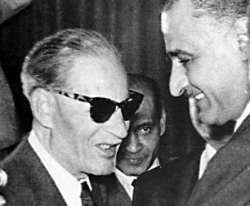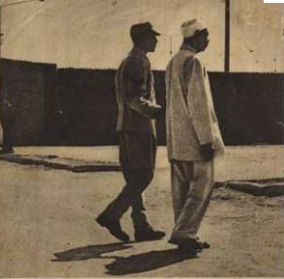At the end of the 40s, Sayyid Qutb, attacked his intellectual colleagues with these words : “this generation of old intellectuals has abandoned their duty. Not only towards young intellectuals but towards their homeland, society, humanity and finally the literary consciousness”. After accusing the whole generation of established intellectuals of serving “imperialist propaganda” during the war, Qutb continued : “and then, when the war ended and Arab nations rose to fight imperialists asking for their rights, I found you all behind, not in the frontlines of the battle. I found you in dens of political parties, not in the national battlefield”. Addressing these words to a whole generation of writers, the one of Abbas al Aqqad, Tewfik al Hakim and Ahmad Amin, Qutb pointed out the most blameworthy one, Taha Hussein. For Qutb, Taha Hussein was guilty not only for national treason, but also for the assassination of literature. “The literature has died!” solemnly announced Qutb in July 1951. “It was killed by the ministry of Education. And where is the minister now? The minister is in France!” It was Taha Hussein who occupied the post of minister of Education at that time. In the fashion of bashawat of those royal times, he was accustomed of spending summers in European countries, accompanied by his French wife.
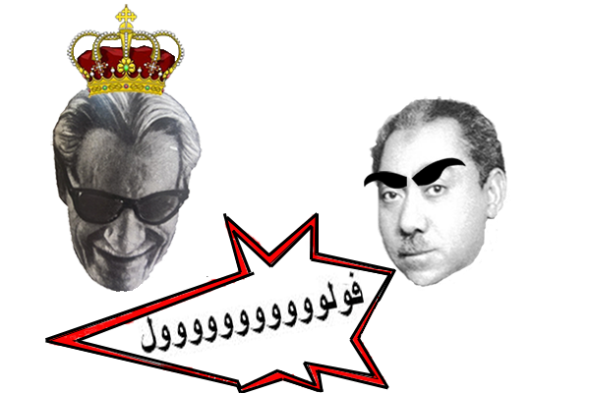
“In dens of political parties..”
It wouldn’t be an overstatement to describe Taha Hussein as an “organic intellectual” of political parties to which he belonged. By joining a new party, Taha Hussein would make the party’s official journal his platform where he would wage a merciless war on that party’s rivals. As a member of Liberal Constitutionalists in 20’s and early 30’s, it was on the pages of the party’s official newspaper al Siyâsa that Taha Hussein was accusing al Wafd’s leader Saad Zaghlul of dictatorship. His hostility to al Wafd remained consistent after he joined for a short period the royalist Ittihâd party. In 1932 Taha Hussein joined his former enemies, the Wafd party, after accepting the offer of Nahhas Pasha to edit Kawkab al Sharq journal. There Taha Hussein revealed himself as a tireless critic of Sidqi and Nuqrashi Pachas’ cabinets in Wafdist newspapers al Balâgh and Kawkab al Sharq. His attacks were so violent that he had to face two complaints filed against him at first by Saad Zaghlul and later by Sidqi Pacha for insulting his minister of Education.
Back then, switching from one political party to another was not an unusual move. Writers were often under patronage of political parties and acted as their mouthpieces. Taha Hussein’s bonds with Liberal Constitutionalists most likely helped to accelerate his career in the Egyptian University after its members-intellectuals managed to tighten their grip on the University council in 1922 by stripping the exiled Saad Zaghlul from his vice rectorship. The Liberal Constitutionalist party comprised the major intellectuals of the time, most of whom were linked to each other by family bonds or friendships : Ahmad Lutfi al Sayid, Abd al Aziz Fahmi, Muhammad Husain Haikal, brothers Mustafa and Ali Abd al Raziq and Taha Hussein. During the controversy stirred by Taha Hussein’s On the Jahili poetry in 1926, it was Liberal Constitutionalists who defended the author while his adversaries were Wafd party members allied with al Azhar. To Taha Hussein’s luck, the University’s rectorship, the ministry of Education and the ministry of Justice were occupied then by his party friends. Similarly, his reasons of joining Liberal Constitutionalists’ rivals al Wafd party were not only ideological. Taha Hussein enjoyed a precious support and sympathy of University students which grew in particular strong after his dismissal from the university by Sidqi Pacha. It happened that the majority of students who walked to the house of Taha Hussein in Heliopolis protesting against his transfer from the University were Wafdists. As a Dean in the University – the epicentre of political activism in the 30’s – Taha Hussein could not but join the Wafd party. In 1935-6 the Egyptian University would witness a massive wave of student demonstrations that would force the authorities to restore the Constitution, abrogated by Sidqi Pacha some years before. A second reason of choosing al Wafd was economical. After his dismissal from the University, Taha Hussein lost his main source of income and his family experienced “the years of famine”, as his wife once defined it. The rumour goes that Taha Hussein was paid nearly 300 pounds for his first article in Kawkab al Sharq, a huge sum for a writer in 30’s. It is not surprising that excellent writers and figures rich of “symbolic capital” such as Taha Hussein were solicited by the leaders of political parties. At the times when partisan press was one of the main political weapons, influential and sarcastic pens such as Taha Hussein definitely added considerable weight to the party. His membership in al Wafd party would allow him to foster his career and to become the minister of Education in the last al Wafd cabinet in 1950.
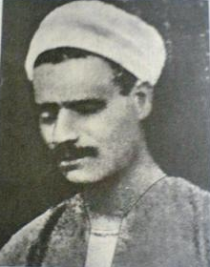
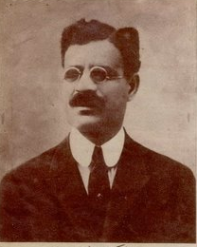
Taha Hussein in Azhar Taha Hussein in the University
Was Taha Hussein a felool ?
If Sayyid Qutb’s accusations hailed upon Taha Hussein for playing a highly discredited party game make sense, no one could accuse him of insensitivity for social ills. Taha Hussein was deeply concerned by Egypt’s social problems and joined widespread calls for social justice and political reform. His stance towards the King was more complex. As a Dean of the University in 40’s, he could not but adopt a conciliatory stance to the King – dedicating his books, inviting the King to the official university occasions, praising and thanking him for his existence. Nevertheless, after his dismissal from the University, Taha Hussein tempted several tentative attacks on the King in his articles. This visibly contradictory stance towards the King derived probably from a double and contradictory identity that intellectuals were upholding : the one of a civil servant serving to the state as a scribe, muwazzaf, and the one of a duty-bound engaged intellectual serving to a society. Put in other terms, intellectuals had to conciliate two contradictory dimensions of their identity, the voice of the State and the voice of the society. This task would reveal disastrous in political crisis when the society goes against the State, as it happens in revolutions.
Nevertheless, by joining al Wafd cabinet as the minister of Education in 1950, Taha Hussein ceased being ambiguous about the King. As a mouthpiece of al Wafd, he was following the official line of the party which adopted a controversial politics of appeasement with the King. Taha Hussein’s conciliatory attitude towards the King while in the minister office will be remembered after the revolution of 1952 : he will be accused of trying to please the King in the Speech of the Throne during his investiture in the ministry, of kissing the King’s hand (while three other ministers refused this honour), of calling the Kind “The moral teacher of people” (ustâz al sha’ab fi al akhlâq), of using his political influence to mount to power, and last but not least, of accepting the rank of Pasha given by the King several months before the coup which will abrogate all ranks. In order to ensure the purity of his revolutionary consciousness, which will be needed in his new role of the mouthpiece of the revolutionary regime, Taha Hussein will deny all these charges. He will seek to attract the attention to his accomplishments while in Ministry such the adoption of free secondary and technical education.
Hand in hand with the Revolution
With the military coup of July 1952, al Wafd’s career was over but the one of Taha Hussein was not. His role in the building of the military regime was crucial. It was Taha Hussein who named for the first time the military coup “the revolution”, one week after the coup in a letter sent to his friend Tewfik al Hakim from his annual summer vocation in Italy. One week after, he compared Egyptian revolution with the French one by stating that the Egyptian revolution is an original one (thawra asliya) for it sought to reform the society. Taha Hussein would insist on naming the event “the revolution” in December in more explicit terms : “it’s not the coup d’Etat, nor the renaissance, nor the army movement, it’s the revolution”. Other intellectuals would rapidly take over this idea. For some weeks, the definition of the event would oscillate between the blessed bounce (al wathba al mubâraka), the army movement (harakat el geish) and revolution (thawra) until the last one imposed itself definitely ar the end of the year. In November 1952, Mohammad Nagib was proclaimed “the leader of the revolution” and in January of the next year the ruling junta switched its name into The Council of the Revolutionary Guidance. It was Egyptian intellectuals – with Taha Hussein in the front line – who defined the event as the revolution thus constructing and providing the Free Officers with the necessary political legitimacy shield.
After greeting with fervour the Revolution, Taha Hussein adopted the stance of uncritical support of the new power, loyally playing the role of the mouthpiece of the military regime. In a number of confrontations between the regime and various political forces that followed, Taha Hussein took always the regime’s side, even when it was attacking his former colleagues. For example, in Mars 1953 with the anxiety mounting over the freedom of expression, Taha Hussein took the side of the regime justifying the censorship in the name of “the protection of the state and the revolution”. He explained : “I don’t think that the freedom to criticize (the regime) is being limited, if by criticism we mean the devotion for the reform and guidance… We tend to forget that we live in the time of the revolution which has the right – and the duty – to protect itself”. He did not change his mind following the wide-spread arrests of communists, the press censorship, the closure of oppositional journals, including al Masry to which Taha Hussein himself was contributing, but rather he would insist that the revolution “has liberated the minds”. Unsurprisingly, Taha Hussein took the side of Gamal Abd al Nasser against Mohammad Nagib in 1954 Mars crisis and in July of the same year was calling to “the stability” because “people cannot be revolted all the time”.
In exchange to his unconditional support, the regime will grant Taha Hussein with superficial but symbolically powerful positions. Although he would never get a minister position – a possibility given by his omission from the “political exclusion” law adopted in April 1954 – Taha Hussein would be placed on the top of the new born cultural institutions, included in the comitee of the Constitution writing and finally appointed as the chief editor of the state owned Gomhoriya newspaper. By giving the key positions to a younger generation of intellectuals playing the role of experts, the regime sought the loyalty of renowned intellectuals of the older generation for propaganda reasons. Take the example of Taha Hussein’s participation in the State published collective propaganda book “Them, the Brotherhood” following its clash with the Muslim Brotherhood at the end of 1954 where Taha Hussein contributed with two anti-Brotherhood articles. The destinies of two intellectuals who were formerly friends – Taha Hussein and Sayyid Qutb – have definitely separated before this date, the former taking the side of the regime, the latter that of the opposition. In the year of 1966, while Sayyid Qutb will be condemned to the death penalty for his controversial book “Milestones”, Taha Hussein will be granted the highest state honour The Order of the Nile.
